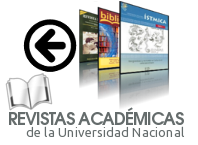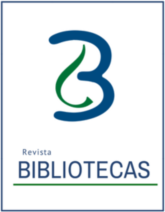Why Study Library and Archives: Review of Career Choice Reasons and Institutional Strategies
DOI:
https://doi.org/10.15359/rb.37-1.2Keywords:
Professional Choice, Profession, Librarianship, Professional ArchivalAbstract
This document reviews the reasons for studying librarianship and archives and the institutional strategies for recruiting students. It is based on a general study of the profession, which considers not only students, but professionals, experts and employers through a mixed study that allows us to know the opinion of this group on the motivations and difficulties to study the career; it is concluded that this is a pending reflection due to problems in the communication of the profession, knowledge of aspirants and conflicts to harmonize quantity and quality of students.
References
Ander-Egg, E. (2006). Claves para introducirse en el estudio de las inteligencias múltiples. Buenos Aires: Homo Sapiens.
Cardona, D. (2012). Prevalencia de intereses y preferencias profesionales en estudiantes de grado 11 de instituciones educativa públicas de la ciudad de Ibagué. Revista Colombiana de Ciencias Sociales, 3 (2).
Castañeda, L.; Solorio, M. (2014). La elección de carrera: entre la vocación y las ofertas institucionales. Revista de Educación y Desarrollo, 28. Recuperado de http://www.cucs.udg.mx/revistas/edu_desarrollo/anteriores/28/028_Castaneda.pdf
Dubar, C. (2000). La socialisation: construcciòn de identités sociales et professionelles. París: Armand Colin.
Escalona-Ríos, L. y Tejada-Artigas, C. (2016). Tan lejos, tan cerca: perfil y percepciones de los alumnos de primer curso de Bibliotecología de la UNAM y de la UCM hacia sus estudios. Investigación Bibliotecológica: Archivonomía, Bibliotecología e Información, 70. DOI: dx.doi.org/10.1016/j.ibbai.2016.10.008
Fernández de Mora, R. (1991). El oficio del bibliotecólogo. Investigación Bibliotecológica, 5 (10).
Gardner, H. (2005). Inteligencias múltiples: la teoría en la práctica. Barcelona: Paidós.
González, M. y Álvarez, I. (2009). La orientación vocacional en los alumnos de ingreso a la Licenciatura en Bibliotecología y Estudios de la Información: una aproximación. Recuperado de http://ru.ffyl.unam.mx:8080/jspui/bitstream/10391/780/1/07_ABEI_Gonzalez_Alvarez_93-105.pdf
Gonzáles, R. (2004). Lo cultural y lo espiritual en la formación médica: apreciaciones de estudiantes de 5to. año de Medicina. Rev Cubana Med Gen Integr, 20 (3), Recuperado de http://bvs.sld.cu/revistas/mgi/vol20_3_04/mgi02304.htm
Hussey, L. (2009). Why librarianship? An exploration of the motivations of ethnic minorities to choose library and information science as a career. En Delmus, W., James, N. y Janine, G. (ed.) Advances in Library Administration and Organization (Volume 28), Emerald Group Publishing Limited, pp. 153 – 217.
Martínez, M. (2007). La investigación cualitativa etnográfica en educación: manual teórico-práctico. México: Trillas.
Martínez-Martínez, A. (2013). La orientación como actividad educativa y vocacional en los itinerarios curriculares del alumnado de Bachiller y Formación Profesional y su inclusión en el mercado laboral. (Tesis Doctoral: Universidad de Granada). Recuperado de http://digibug.ugr.es/handle/10481/30837
De la Mano, M. y Moro, M. (2013). Motivaciones en la elección de la carrera universitaria: metas y objetivos de los estudiantes del Grado en Información y Documentación en la Universidad de Salamanca, en Investigación en Información. Documentación y Sociedad. Diálogos entre Brasil y España, A. Cuevas Cerveró y E. Simeão (coord.), 517-534. Madrid: Facultad de Ciencias de la Documentación. (Universidad Complutense). Recuperado de https://books.google.es/books?hl=es&lr=&id=wvj3AwAAQBAJ&oi=fnd&pg=PA185&dq=elecci%C3%B3n+profesional&ots=oQyc1t_0Vi&sig=TU1m1YkYyrDhIFfg0Sw69_fzMWw#v=onepage&q=elecci%C3%B3n%20profesional&f=false
Newbutt. S. (2012). ¿Qué impresiones tiene la gente sobre la bibliotecología como carrera profesional? Revista Interamericana de Bibliotecología, 35 (3). Recuperado de http://www.scielo.org.co/pdf/rib/v35n3/v35n3a7.pdf
Remy, B. (2011) Exploring the Social Culture of Librarianship through the Identifications and Experiences of Library Workers Who Are Members of Marginalized Social Groups. Recuperado de http://dagda.shef.ac.uk/dispub/dissertations/2010-11/External/BRemy_zzz_Formatted_Dissertation_done.pdf.
Rivas, F. y Pascual, F. (2003). Inventario de influjos/circunstancias vocacionales. En F. Rivas. (2003). Asesoramiento vocacional: teoría, práctica e instrumentación. Anexo Capítulo 1. Barcelona. Ariel
Rubio, N. (2006). Una propuesta de orientación vocacional para la educación media, diversificada y profesional venezolana. Buenos Aires: Fundación El Libro y Guía del Estudiante.
Strauss, A., y Corbin, J. (2002). Bases de la investigación cualitativa: técnicas y procedimientos para desarrollar la teoría fundamentada. Medellín: Universidad de Antioquia.
Vallejo-Sierra, R. (2010). Representaciones sociales de la bibliotecología: una mirada desde los jóvenes que culminaron los estudios secundarios. Revista Códice, 6 (1).
Vallejo-Sierra, R. (2014). La bibliotecología como profesión en Colombia. (Tesis Doctoral). Universidad de Salamanca.
Downloads
Published
How to Cite
Issue
Section
License
Bibliotecas provide immediate open access to their content, based on the principle of facilitating research to the public free of charge and free of charge to promote the global exchange of knowledge.
The journal Bibliotecas is a publication hosted by a public higher education institution, which is supported by public resources. Since its inception, the magazine has offered all its contents free of charge without any restriction on the rights of: reading, downloading and printing in full text. Works published in libraries may be analyzed, quoted and reproduced in whole or in part, mentioning the original source.
The journal Bibliotecas is licensed under the Creative Commons Attribution - Non-Commercial - Share Equal, 4.0 International license; therefore, it is allowed to: share, copy and redistribute the material in any medium or format.

Este obra está bajo una licencia Creative Commons Atribución-NoComercial-CompartirIgual 4.0 Internacional.








